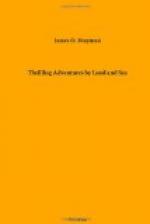The party rode first to Tom Cooper’s hut, and there, having dismounted, leading their horses through the forest, followed the trail, as only men long accustomed to savage life can do. At night they lay on the ground, covered with their thick, bear-skin cloaks: for Susan only, they heaped a bed of dried leaves; but she refused to occupy it, saying, it was her duty to bear the same hardships they did. Ever since their departure, she had shown no sign of sorrow. Although slight and delicately formed, she never appeared fatigued: her whole soul was absorbed in one longing desire—to find her husband’s body; for, from the first, she had abandoned the hope of ever again seeing him in life. This desire supported her through everything. Early the next morning they were on the trail. About noon, as they were crossing a small brook, the hound suddenly dashed away from them, and was lost in the thicket. At first they fancied they might have crossed the track of a deer or wolf; but a long, mournful howl soon told the sad truth, for, not far from the brook, lay the faithful dog on the dead body of his master, which was pierced to the heart by an Indian arrow.
The murderer had apparently been afraid to approach on account of the dogs, for the body was left as it had fallen—not even the rifle was gone. No sign of Indians could be discovered, save one small footprint, which was instantly pronounced to be that of a squaw. Susan showed no grief at the sight of the body: she maintained the same forced calmness, and seemed comforted that it was found. Old Wilton staid with her to remove all that now remained of her darling husband, and his two sons set out on the trail, which soon led them into the open prairie, where it was easily traced through the tall, thick grass. They continued riding all that afternoon, and the next morning by daybreak were again on the track, which they followed to the banks of a wide but shallow stream. There they saw the remains of a fire. One of the brothers thrust his hand among the ashes, which were still warm. They crossed the river; and, in the soft sand on the opposite bank, saw again the print of small, moccasined footsteps. Here they were at a loss; for the rank prairie-grass had been consumed by one of those fearful fires so common in the prairies, and in its stead grew short, sweet herbage, where even an Indian’s eye could observe no trace. They were on the point of abandoning the pursuit, when Richard, the younger of the two, called his brother’s attention to Nero, who had, of his own accord, left his mistress to accompany them, an if he now understood what they were about. The hound was trotting to and fro, with his nose to the ground, as if endeavoring to pick out a cold scent Edward laughed at his brother, and pointed to the track of a deer that had come to drink at the river. At last he agreed to follow Nero, who was now cantering slowly across the prairie. The pace gradually increased, until, on a spot where the grass had grown




